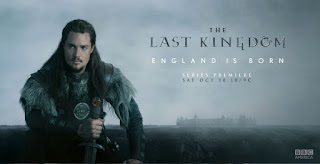TEACHERS WATCH FILMS AND REVISE COUNTRYSTUDY
I'm sure you have heard such names as Northumbria, Mercia, Wessex, East
Anglia. In what centuries were they used?
Do you know the names of some kings or queens that
lived in those times?
Who was Britain's greatest enemy in that period of
time?
If you know the answers to the questions above, then you can be really
proud of yourself and of your historical knowledge.
My post is for those who would like to find out more about Britain's
history and culture but are not very much fond of historical books and
would prefer a good historical film to it.
I'd like to draw your attention to a really good film I
have recently watched, which mixes history and fiction. It's called The Last Kingdom. The film is really
fantastic! I watched it and really couldn't have enough of it. I can strongly
recommend it for the teachers of English due to several aspects that are touched
upon in this film. You won't watch this film with your pupils as there are many brutal scenes, but for us teachers there is a lot to revise and ponder of.
1. Place names. Do you know how London was earlier
called? Lundonia, Lundenberg, Lundenne, Lundene, Lundenwic, Lundenceaster, and
Lundres. In the film the names of the places in Britain are given in 2
variants, old and modern one.
 2. Historical facts. The action taked place in the 9-10th centuries when Britain was invaded by
the Danes, the Vikings. Except for numerour battle scenes it gives a lot of
food for thought. One shouldn't underestimate the influence of the Viking's
culture on the English language.
2. Historical facts. The action taked place in the 9-10th centuries when Britain was invaded by
the Danes, the Vikings. Except for numerour battle scenes it gives a lot of
food for thought. One shouldn't underestimate the influence of the Viking's
culture on the English language.
The Danes were of the same Germanic origin as the Anglo-Saxons
themselves and came from the same part of the Continent. As the roots were the
same in English and Danish and the languages assimilated, case endings were
dropped and new grammar forms developed to show relations of words. The
dropping of endings meant that the stress was changed, the sound and rhythm of
the language became different. Many English words are of the Scandinavian
origin:
English
|
Scandinavian
|
Fellow
|
feolaGa
|
Husband
|
husbonda
|
Law
|
laGu
|
wrong
|
wrang
|
to call
|
kalla
|
to take
|
taka
|
A thousand Norse place names can be indentified to this day by the
suffixes -by, thorp, -beck, -dale, and -thwaite which meant ‘village,
settlement’. Thus we have Derby, Grimsby, Whitby, Lowestoft, etc.
There are about nine hundred Danish words in Standard English
In English the day-to-day words are Scandinavian, and there are many of
them.
Here are some examples: anger, awe, bag, band, big, birth, both,
bull, cake, call, cast, cosy, cross, die, dirt, dream, egg, fellow, flat, gain,
get, gift, give, guess, guest, hug, husband, ill, kid, law, leg, lift, likely,
link, loan, loose, low, mistake, odd, race, raise, root, rotten, same, seat,
seem, sister, skill, skin, skirt, sky, steak, though, thrive, Thursday, tight,
till, trust, ugly, want, weak, window, wing, wrong.
The language adopted many words from the Danelaw's inhabitants who
were of Norwegian and Danish descent. For example, all the lexical words in
this sentence are Scandinavian: He took the knife and cut the steak. Only he,
the and and come from Old English.
Word order: In English and Scandinavian the object is placed after
the verb:
I have read the book.
Eg har lese boka.
I have read the book.
Eg har lese boka.
3. The third reason to watch the film is the language itself. It's a melody you listen to and that follows you in your mind:-)
4. The architecture. You'll see how their dwellings looked like, both of the Danes and the Saxons.
5. Clothes of the Danes and the Saxons. Even looking at the way their hair is organized, you'll understand the origin of today's hairdos for men and women.
To put is shortly, you have to watch this film. It will be best to do it on ororo.tv Write in the search The Last Kingdom and enjoy the film with English subtitles.
To watch all the film for unlimited time, you have to subscribe, BUT if you don't wish to do that, you can watch each day one episode for free, which can also be a good solution.
Share your impressions after watching the film in the comments. What was the insight for you?


No comments:
Post a Comment